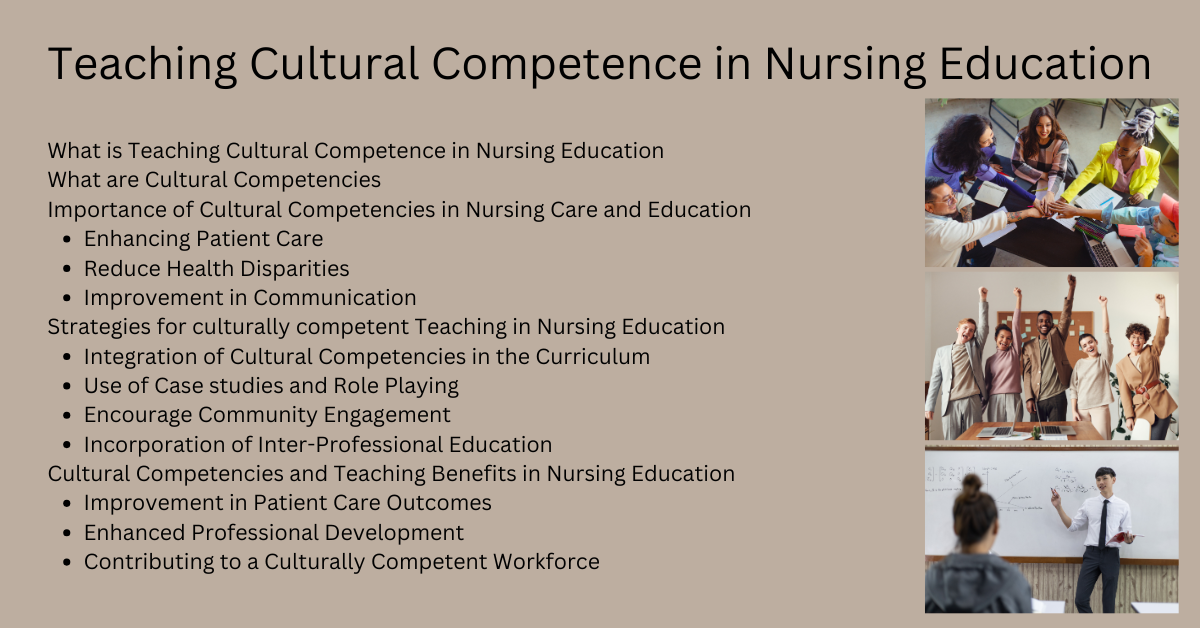The Teaching Cultural Competence in Nursing Education. Cultural competence is important in nursing education because it promotes equal access to learning. It provides students with a sense of acceptance, value, and freedom to learn.
What is Teaching Cultural Competence in Nursing Education
Teaching cultural competence in nursing education is crucial to preparing nurses to provide culturally sensitive and effective care to diverse patient populations. It provides nurses with the knowledge, skills, and attitudes necessary to understand and respect cultural differences, beliefs, and practices, ultimately leading to improved patient outcomes.
Cultural competence in nursing is defined as a combination of knowledge, skills, and attitudes applied to clinical nursing practice in an intercultural context (Cerezo et al., 2014; Paric et al., 2021).
Culturally competent nursing requires nurses to combine their knowledge and skills with awareness, curiosity, and sensitivity to the cultural beliefs of their patients. Developing cultural competence requires motivation, time, and practice, and will evolve throughout a nursing career.
What are Cultural Competencies
In nursing education cultural competencies are essential skills for professionals that enable them to provide efficient and effective care to diverse groups of patient in respectful way. Today in the health care system demographics of patients continue to evolve, nursing education must prioritize educating cultural values to ensure that future nurses will be equipped to deal with such unique characteristics of patients based on cultural differences. Let’s discuss and explore the significance of educating cultural competencies for effective teaching strategies, and the benefits of teaching such cultural awareness in nursing education.
Importance of Cultural Competencies in Nursing Care and Education
Cultural competency is defined as the ability to understand, communicate with and effectively interact with people across the different cultures.so the cultural competency is pivotal for several reasons in nursing education.
Enhancing Patient Care
When a nurses culturally competent enough they can provide patient centered care that keep respect for individual values, beliefs, and practices in healthcare system. A nurse with cultural understanding build trust with patients and promotes better health care outcomes.
Reduce Health Disparities
A nurse with cultural competencies better address health disparities by enabling nurses to identify and respond to specific needs of culturally diverse population. When a nurse is aware of cultural influences on health behaviors habits and attitudes, nurses can mold their interventions according to the need of patient.
Improvement in Communication
In nursing practices effective communication is key to successful nursing practices. Patient satisfaction would increase when culturally competent nurses are better equipped to navigate language barriers and nonverbal clues in the nuances leading to clear communication in health care system.
Strategies for culturally competent Teaching in Nursing Education
Integration of Cultural Competencies in the Curriculum
The core values of the curriculum should be incorporated in the nursing education programs. The coursework on cultural awareness, social determinacy of health and specific health issues affect diverse populations in healthcare recipients.
Use of Case studies and Role Playing
By doing case studies and role-playing activities an educator can provide a nursing student with practical experience in navigating cultural challenges in the healthcare system they continuously face. Such methods encourage nursing students to think critically about their assumptions and biases when they are developing empathy and understanding.
Encourage Community Engagement
When students are involved in the community services or outreach programs that can expose them to diverse population and cultural values and practices. It can be done by allowing the students to learn firsthand about different cultures and the health disparities that exist inside them.
Promotion of Self-Assessment and Reflection
A self-reflection on cultural beliefs, biases, and experiences can also foster nursing students for personal growth. It is also a tool such as journals or discussions prompts, can help students to identify areas of improvement in their cultural competencies.
Incorporation of Inter-Professional Education
Cultural competencies can be enhanced when there is collaboration with other disciplines. It promotes teamwork and a broader understanding of culturally sensitive care, when nursing students learn alongside students from other professions.
Cultural Competencies and Teaching Benefits in Nursing Education
Improvement in Patient Care Outcomes
When nurses are culturally competent and more likely to provide effective care that meets the needs of diverse populations of patients that leads to improvement in the health care outcomes and patient satisfaction in healthcare systems.
Enhanced Professional Development
The education of cultural competencies prepare nursing students for a successful career in increasingly versatile healthcare environment. When nurses are culturally aware about are better equipped to navigate the challenges during their practices and generate a relationship with patients and coworkers.
Contributing to a Culturally Competent Workforce
When cultural competencies are prioritized in nursing education, institutes can contribute to the more culturally competent health care workforce in practices. By this shift they can address systematic health disparities and promote equitable care for all care recipients.
Conclusion
Education of cultural competence in nursing education is necessary for the preparation of future nurses for effective, respectful, and patient centered care in cultural diversity in healthcare settings. The incorporation of cultural competence in the nursing curriculum, utilizing practical teaching strategies and promotion of self-reflection in nursing can empower nursing students to embrace diversity and advocate equitable health services. As we see healthcare landscapes have continuously evolved, fostering cultural competence will ensure the future nursing professional should meet the needs of culturally diverse population of healthcare recipients.
Read More:
https://nurseseducator.com/didactic-and-dialectic-teaching-rationale-for-team-based-learning/
https://nurseseducator.com/high-fidelity-simulation-use-in-nursing-education/
First NCLEX Exam Center In Pakistan From Lahore (Mall of Lahore) to the Global Nursing
Categories of Journals: W, X, Y and Z Category Journal In Nursing Education
AI in Healthcare Content Creation: A Double-Edged Sword and Scary
Social Links:
https://www.facebook.com/nurseseducator/
https://www.instagram.com/nurseseducator/
https://www.pinterest.com/NursesEducator/
https://www.linkedin.com/in/nurseseducator/
https://www.researchgate.net/profile/Afza-Lal-Din
https://scholar.google.com/citations?hl=en&user=F0XY9vQAAAAJ

I rdad this paragraph completely abot the difference of hottest
and preceding technologies, it’s remarkable article. https://glassi-greyhounds.mystrikingly.com/